In the Still of the Night Read online
Page 25
Donna Wilson would be in the courtroom every day, although her husband wouldn't appear again until the final day of the hearing.
Surprisingly, there were many vacant seats in the gallery now that so many jurors had been dismissed. Perhaps townspeople hadn't expected the hearing to start until the next day.
And then it began. Ronda's family was about to spend their twelfth Christmas without her, but first they had to get through the hearing and then Thanksgiving. The holiday season was still a painful time for them to face. Even in early November, the store windows in Chehalis were already decorated for Christmas.
Sitting in Judge Hicks's courtroom, Barb Thompson knew that she was far luckier than many parents who rail against the way their children's deaths were investigated.
Still, she dreaded what was to come.
ROYCE FERGUSON rose in response to Judge Hicks's signal. He turned to the charts he had prepared so that the jurors could quickly become familiar with the players in this tragedy.
Television cameras from KOMO-TV were allowed in the courtroom, and so were newspaper photographers. A few interested laypersons had also brought their digital cameras.
Ferguson described Ronda--how she was born in 1965 and grew up to become the youngest female Washington State Patrol cadet. He covered Ron and Ronda's premature May-October wedding. Neither of them had been free to marry for very long. Many couples would have waited until the ashes of their former marriages had cooled, but Ron and Ronda rushed into a wedding ceremony on January 2, 1998. Everything had seemed right then; even the similarity of their names seemed to validate that.
Ron and Ronda.
Ronda had been so happy at her wedding on the second day of a new year. Her life with Ron stretched into the future, full of second chances. She was only thirty-two; she hoped to bear Ron's children as well as help him look after his sons.
But Ferguson explained that Ronda lived for only eleven months after her wedding.
She knew as the next holiday season approached that her new marriage was over. Ferguson told the jurors that Ronda planned to fly to Spokane on December 16 to spend Christmas with her mother, grandmother, and brother. Her marriage had wound down to the end at Ron Reynolds's request, and she needed to be with those who loved her.
"She was going to come back from Spokane and find an apartment."
But, of course, Ronda never left the house on Twin Peaks Drive on that long mid-December night.
This was not a murder trial. This hearing wasn't to indict anyone for Ronda's shooting, although Ferguson acknowledged that the three persons of interest were Ron Reynolds, Katie Huttula, and their son, Jonathan (who was the prime suspect in the killing of Ronda's pet dogs, and was rumored to have shot cats).
None of them was required to be in the courtroom or to testify.
No, the legal question before them was to decide whether Terry Wilson had been derelict in his duties as coroner. Why had he had made four different judgments on the manner of Ronda's death on succeeding death certificates over the prior decade?
"Terry Wilson didn't go to the scene where Ronda died," Ferguson explained, "nor did he attend her autopsy. In both instances, Carmen Brunton did."
All detectives know--or should know--that they must first consider that a death is a homicide. Then suicide. Then accidental. And finally either "natural" or "undetermined." Except for Jerry Berry and Bob Bishop, all of the sheriff's staff who looked into Ronda's death skipped over "homicide" as a possible option.
Royce Ferguson listed the death certificate explanations, pointing out that the first one had been "corrected" three times.
1. Undetermined
2. Suicide
3. Undetermined
4. Suicide
"No wonder Jerry Berry came to wonder if the crime scene was a staged suicide. No way is this a real suicide!" Royce said. "There are none of Ronda's fingerprints on any of the six bullets."
Nor were there anyone else's.
Barb Thompson wasn't seeking money. The Lewis County Sheriff's Office's investigation wasn't at issue. Ron Reynolds wasn't technically involved. This was all about how Coroner Terry Wilson had handled Ronda's death investigation on December 16, 1998--and in the years that came after.
All Barb Thompson wanted in this hearing was to have "suicide" removed from Ronda's death certificate. She had learned to modify her goals after so many years of disappointment.
FERGUSON TOLD THE JURY of the red flags that had popped up, making both Detective Jerry Berry and Deputy Bob Bishop question what had really happened on the very first day. Why was Ron Reynolds's wedding ring off his finger, leaving a pale strip of skin? Why was the main bathroom in the Reynolds's house all steamed up as it would be if someone had recently taken a shower? And, yes, Ron Reynolds's wedding ring was there in the soap dish of his master bathroom.
The bottle of Black Velvet in the master bedroom--allegedly removed from its usual place in the kitchen--was on Ronda's nightstand. There was a can of Pepsi and two glasses sitting on the floor near the waterbed. The whiskey had, Reynolds said, been a quarter full. When deputies arrived, it was empty--but who had drained the bottle? Ronda didn't drink hard liquor. Ron said he hadn't drunk any of it on December 15-16.
Royce Ferguson read the list of witnesses he intended to call: Barbara Thompson, David Bell (Ronda's longtime friend), Robert Bishop (the second Lewis County officer on the scene), Jerry Berry, Marty Hayes, and Dr. Jeffrey Reynolds, a forensic pathologist unrelated to Ron.
He informed the jurors of Jerry Berry's twenty-one questions that he needed answers for. "These were important questions," Barb's lawyer pointed out, "but he was shut down. He butted heads with the brass, and finally, he's off the case. He's working in a hostile environment [in the Lewis County Sheriff's Office] and he resigned."
The jurors' inscrutable expressions changed just a little when he told them that Katie Huttula, Ron's ex-wife, had walked out from the master bedroom only about a day after Ronda's body had been removed.
"Ronda's own mother can testify to that--Barb Thompson saw Katie there, in a bathrobe."
Coroner Terry Wilson had, Ferguson, said "relied on the sheriff's office to decide the manner of Ronda Reynolds's death. Jerry Berry never sued the sheriff's office. He took his retirement and kept going until he got another job."
Ferguson said that Marty Hayes would testify. He explained that Hayes was a ballistics expert. "He came into Ronda's case one hundred percent sure that Ronda Reynolds had been murdered."
Sergeant David Bell would tell the jurors about his long friendship with Ronda, Ferguson said. Bell was the last person to see Ronda alive--other than the Reynolds family--on that deadly Tuesday night.
Not surprisingly, the surname of the last witness scheduled came as something of a shock to the gallery. Dr. Jeff Reynolds, the chief medical examiner for nine Washington counties, would give his opinion on the method of Ronda's death. He was not related to any of Ron Reynolds's family, but it seemed bizarre that one of the prime witnesses for Barb Thompson's side of this hearing had the same name as one of the prime suspects.
Royce Ferguson was winding up his opening statement.
"No way," Ferguson said in a loud voice, "is this a real suicide!" He promised to show the jury evidence and testimony to prove that.
THAT MADE SENSE, but there were those in the gallery who murmured to each other in the hall later--wondering why further investigation hadn't been able to come up with a category for the manner of Ronda's death. Why had Wilson's office waffled over that for eleven years? They stopped their whispered comments as the jurors walked by, headed for a break in the jury room.
Attorney Justice skipped rapidly to criticism of Ronda. He brought up the credit cards that Ronda was reputed to have used with phony names. Perhaps she had turned to thoughts of self-destruction when that came to light? But had she been suicidal? The coroner's attorney brought up the prescription that Ronda had had filled for Zoloft seven months before she died. Detectives
had found the bottle in the master bathroom; Justice didn't mention that more than half of the capsules were still in the container. He may not have known that Ron Reynolds was the one who first mentioned Zoloft to the detectives.
Justice told jurors that Ronda had no financial interest in the house she'd shared with Ron Reynolds. He said there had been no monetary input from her. He told them that Ronda had a trace of gunshot residue on her hand--he did not tell them that none of the others known to be in the house the night she died had been tested for gunshot residue.
He quoted Cheryl Gilbert, Ronda's clingy friend, whom she'd allegedly told she wished she could go to sleep and never wake up. Didn't that suggest she was suicidal?
Those few people who knew about Ron Reynolds's rumored affair with his ex-wife Katie could correlate the date on the mood-elevating drug's container to the time Ronda first suspected he wasn't being faithful.
"There is no physical evidence tying anyone to Ronda Reynolds's death," Justice stated.
That was essentially true. In intrafamily situations, the physical evidence that detectives often depend on--fingerprints, bodily fluids, hairs, fibers, etc.--are already there when a crime is committed. So it is much harder to incriminate suspects who live in the same house with the victim or who visit often. All that physical evidence is virtually useless. Had someone who lived outside the Reynolds's home left that telltale physical evidence, it would have been important.
But not in this case. Investigators hadn't found any unknown prints or hairs or fibers. And the unfired bullets in the death gun had been wiped clean, as well as the gun itself.
No one could argue with Justice as he ended his remarks: "This is one of the most unusual cases you'll ever hear--and the most difficult."
Indeed, it was--and it would continue to be so.
BARB THOMPSON was the first witness. She wore one of Ronda's suits. It was pink and gray, and it fit her perfectly. Even though they hurt her feet and gave her blisters, she wore matching high-heeled pumps. Barb was far more comfortable in cowboy boots, but she and Ronda had always traded clothes.
Barb's hair had gone white over the eleven years and it went startlingly well with her bright blue eyes. She had been a beautiful young woman and she was now a striking middle-aged woman. But she was so nervous she practically vibrated; the week ahead would be vitally important to her. Wearing Ronda's suit made her a little less nervous.
She took the stand at 3:55 P.M. on that first Monday afternoon. Royce Ferguson asked her about her own profession, and she explained that she bred and sold registered American quarter horses--Palominos and Paints--and that she also trained and showed them. Ronda had been, she testified, just as enthusiastic about horses--and all animals--as she was.
"Ronda won numerous horse riding awards," she said.
Barb's eyes were dry at first as she recalled how much Ronda had packed into her sadly short life. After high school graduation at eighteen, Ronda went to community college and then signed on with the Washington State Patrol at the age of twenty.
"That was her dream since she was a girl," Barb said. "Her motto was 'No fear.' She spent eight years on road patrol after that."
Barb hadn't worried about Ronda when she was a trooper; she knew her daughter was capable and smart, and if either one of them ever felt uneasy, they reminded each other that "No fear" was what they both lived by.
When her marriage to Mark Liburdi ended, Barb told the jurors that Ronda and Mark put the ranch in McCleary up for sale. Ronda was due to get about $5,000 when the sale closed.
"Did you know Ron Reynolds before Ronda married him?" Royce asked.
Barb explained to the jurors that she hadn't met Ron Reynolds before Ronda married him. They lived three hundred miles apart, and Ron and Ronda's decision to marry happened so quickly.
"They moved from McCleary to Toledo when Ron got a job there--and I lent Ronda fifteen thousand dollars to put into their new house," Barb added.
Ronda had been a little concerned about Ron's three sons, who lived with them, describing them as "troubled boys with issues." But Ronda had helped raise Mark's three children and their early frostiness toward her melted; she felt she could do it again with Ron's boys.
It hadn't been as easy.
Barb testified that she had been worried about her daughter's safety after Ronda told her that Jonathan, seventeen, had threatened to kill her in early 1998, after she had been his stepmother for only a few months.
Ronda hadn't been as worried as Barb, but she had been angry when Jonathan snuck into the master bathroom and peeked at her when she was naked, taking a shower. The third time it happened, she had to physically "take him down."
Ronda told her mother that Jonathan was embarrassed and infuriated to find himself weaker than a woman, but Ronda had hand-to-hand-combat training.
"After that incident, he appeared to hate her more than ever and wasn't going to change his feelings."
Ronda had always worked, Barb testified. After resigning from the state patrol, and before her divorce, she had undergone the Walmart chain's store security training in Aberdeen, Washington, in Grays Harbor County and then in Centralia.
Barb testified that she would take horses over to McCleary and she and Ronda often rode through the woods and on the beach.
Barring the horse trailer incident, Ronda and Mark Libirdis' divorce had been as amicable as such an event could be. Each had gone on to other relationships once they were free.
As Royce Ferguson questioned Barb Thompson about the trouble in her daughter's second marriage, she answered that Ron had admitted his affair with Katie Huttula, and that it was he who wanted the divorce. But it had hardly come as a surprise. Ronda was aware of Katie's interference in her marriage for months before that.
"Did you speak with your daughter on December fifteenth?"
"Yes--three times. In the early morning, later that day, and then late at night."
At the time of their last call, Barb said Ronda was planning to fly to Spokane the next morning. She already had her life planned out. Since Katie had been convicted on drug charges, Ronda said she wanted to wait for a clean six-month HIV test before she would agree to go ahead with a divorce. She intended to finish out her probationary period in store security at Macy's, and then ask for a transfer to another area. Barb and Gramma Virginia had hoped that meant she was soon coming home to Spokane.
For good.
But, of course, Barb had met two Alaskan flights at the Spokane airport to pick up Ronda for her Christmas visit. And Ronda wasn't on either one.
And so Barb Thompson's nightmare began.
Royce Ferguson led his witness through the ups and downs of eleven years. The case of Ronda's death had been closed, reopened, closed again, while Barb gathered information. It was only through the grace of God, she felt, that Jerry Berry, Marty Hayes, and Royce himself had jumped on board to help her in her almost impossible quest.
Ferguson had explained to Barb that the best hope was to file for a judicial review of the case.
"Then let's get one," Barb Thompson had said.
With his questions to Barb, Ferguson acknowledged to the jurors that that was what he aimed to do. Barb explained that she filed for the judicial review in 2006, only to be turned down. Two years later the Washington State Court of Appeals reversed the earlier decision and unanimously granted the judicial review to be held here in November 2009.
It was a tremendous victory for her and her team. And it was also a landmark case. That was why, he explained, coroners from other counties were monitoring this hearing. They would give their findings to a special meeting of the Washington Association of Coroners and Medical Examiners. Cowlitz County Coroner Tim Davidson was in court; he was vice president of the association.
VIEWING THE JURORS, it was obvious that some of them were probably Barb's age, with children about Ronda's age. Would they identify with Barb? There were a few young women who would probably identify with Ronda. But trying to guess w
hat jurors are thinking is a fruitless task; once jurors are sworn in--in any trial, anywhere--they almost immediately master a noncommittal facial expression.
There might even be some of them like the dismissed juror who had cheerfully wished Terry Wilson good luck.
One thing was clear: the jury was listening intently to what Barb Thompson was saying on the witness stand. I'd never seen a jury so universally attentive. This was really the first time she had gotten a chance to tell the story of her lost daughter to a jury. Her face was easy to read; she was stressed almost to the breaking point--but she managed to finish her testimony.
It had been a very long day. John Justice had cross-examined Barb Thompson, but that had done nothing to endear him to the jury, and she bristled at his questions.
David Bell was the next witness. Still working for the Des Moines Police Department, he was fifty-three now--his hair and mustache snow white, and grief had etched lines on his face. Bell probably wished he was anyplace but in this courtroom. But he had promised Barb Thompson that he would always be there for her. And he had total recall of the last time he had seen Ronda Reynolds. Indeed, he might be the last person--save her killer--who saw Ronda alive.
Bell had never married over the years. He'd raised his sons and risen to sergeant in his department. Des Moines police had had a number of homicides since Ronda's death, including the cold-blooded shooting of one of their own.
Bell had lived through it all, and as he testified, there was the sense that he had asked the same questions of himself hundreds--thousands--of times. Why had he left Ronda alone in Toledo? Why didn't he at least take her to a motel, where she could lock the door and be safe? Had she been giving him some message that he hadn't picked up on?
Did he still blame himself for making wrong decisions the last night of Ronda's life? And yet there was no way he could have known about the danger there.

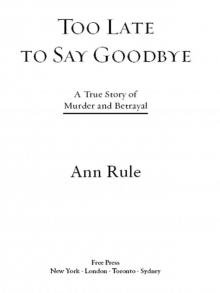 Too Late to Say Goodbye: A True Story of Murder and Betrayal
Too Late to Say Goodbye: A True Story of Murder and Betrayal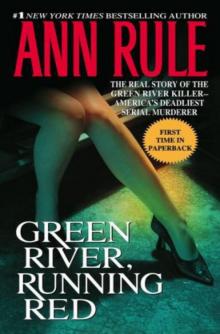 Green River, Running Red
Green River, Running Red Bitter Harvest
Bitter Harvest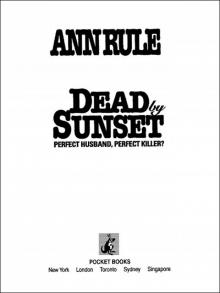 Dead by Sunset: Perfect Husband, Perfect Killer?
Dead by Sunset: Perfect Husband, Perfect Killer?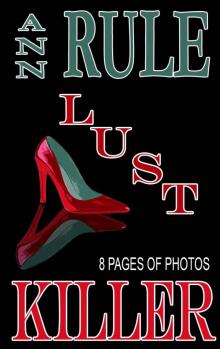 Lust Killer
Lust Killer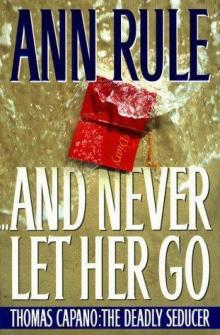 And Never Let Her Go: Thomas Capano: The Deadly Seducer
And Never Let Her Go: Thomas Capano: The Deadly Seducer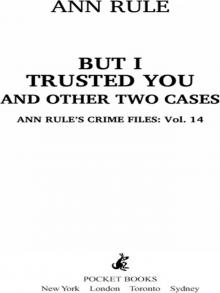 But I Trusted You and Other True Cases
But I Trusted You and Other True Cases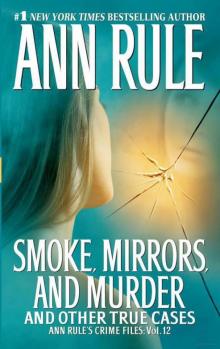 Smoke, Mirrors, and Murder and Other True Cases
Smoke, Mirrors, and Murder and Other True Cases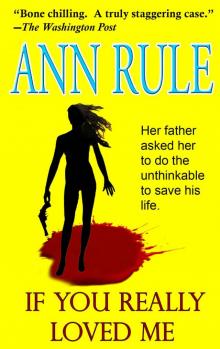 If You Really Loved Me
If You Really Loved Me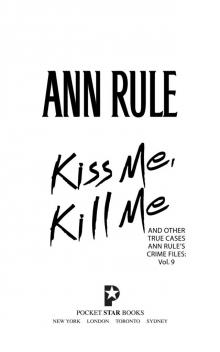 Kiss Me, Kill Me and Other True Cases
Kiss Me, Kill Me and Other True Cases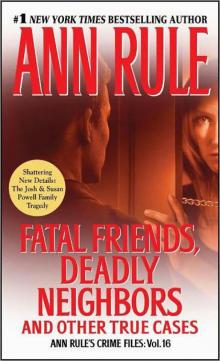 Fatal Friends, Deadly Neighbors and Other True Cases
Fatal Friends, Deadly Neighbors and Other True Cases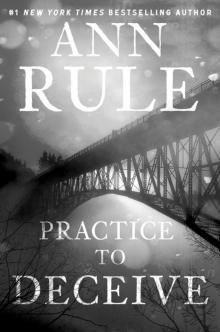 Practice to Deceive
Practice to Deceive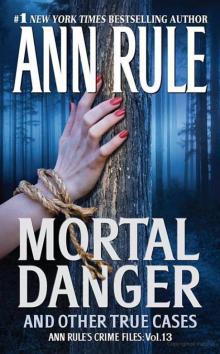 Mortal Danger and Other True Cases
Mortal Danger and Other True Cases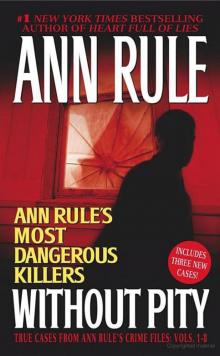 Without Pity: Ann Rule's Most Dangerous Killers
Without Pity: Ann Rule's Most Dangerous Killers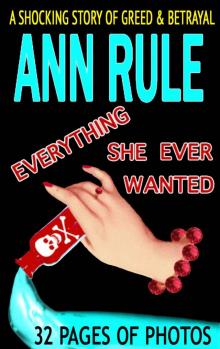 Everything She Ever Wanted
Everything She Ever Wanted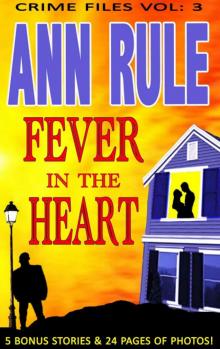 A Fever in the Heart and Other True Cases
A Fever in the Heart and Other True Cases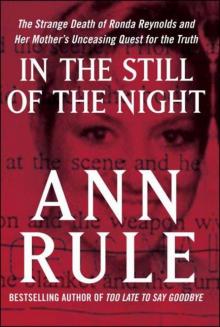 In the Still of the Night
In the Still of the Night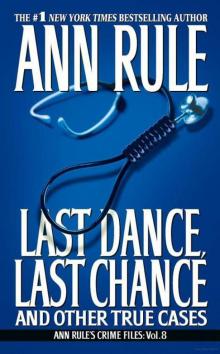 LAST DANCE, LAST CHANCE - and Other True Cases
LAST DANCE, LAST CHANCE - and Other True Cases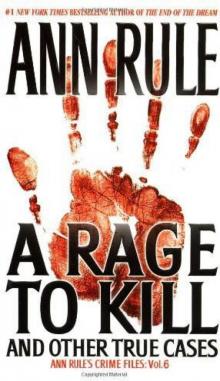 A Rage to Kill
A Rage to Kill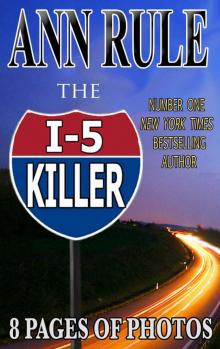 The I-5 Killer
The I-5 Killer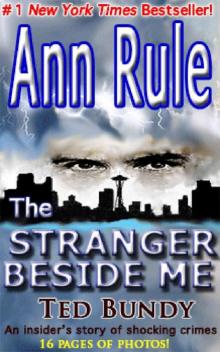 The Stranger Beside Me
The Stranger Beside Me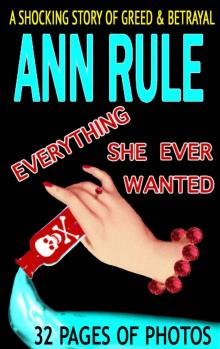 Everything She Ever Wanted: A True Story of Obsessive Love, Murder, and Betrayal
Everything She Ever Wanted: A True Story of Obsessive Love, Murder, and Betrayal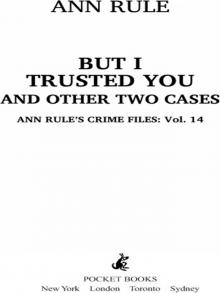 But I Trusted You
But I Trusted You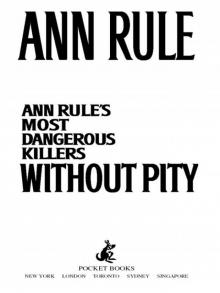 Without Pity
Without Pity Kiss Me, Kill Me
Kiss Me, Kill Me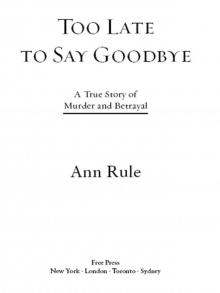 Too Late to Say Goodbye
Too Late to Say Goodbye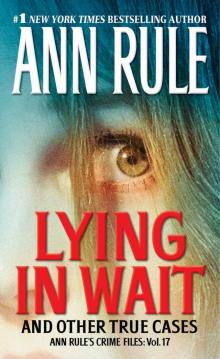 Lying in Wait
Lying in Wait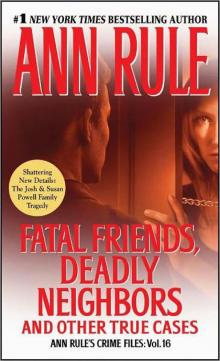 Fatal Friends, Deadly Neighbors
Fatal Friends, Deadly Neighbors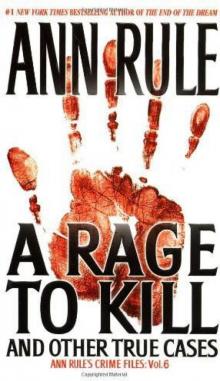 A Rage to Kill: And Other True Cases
A Rage to Kill: And Other True Cases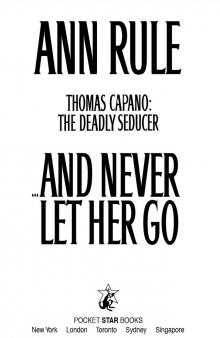 And Never Let Her Go
And Never Let Her Go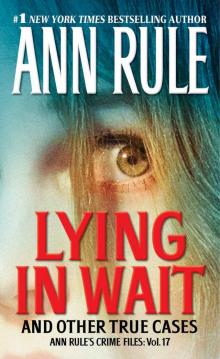 Lying in Wait Ann Rule's Crime Files Vol.17
Lying in Wait Ann Rule's Crime Files Vol.17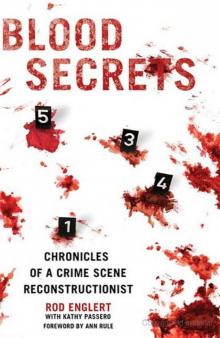 Blood Secrets: Chronicles of a Crime Scene Reconstructionist
Blood Secrets: Chronicles of a Crime Scene Reconstructionist No Regrets
No Regrets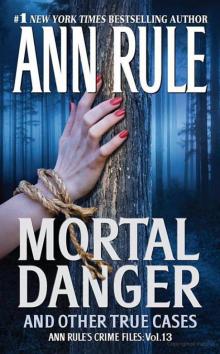 Mortal Danger
Mortal Danger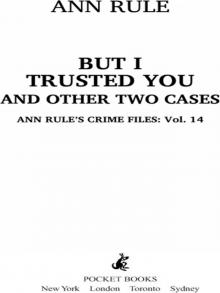 But I Trusted You: Ann Rule's Crime Files #14
But I Trusted You: Ann Rule's Crime Files #14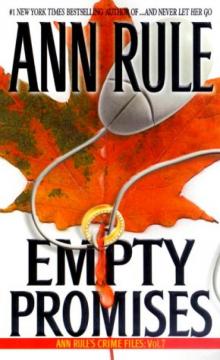 Empty Promises
Empty Promises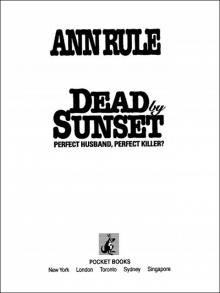 Dead by Sunset
Dead by Sunset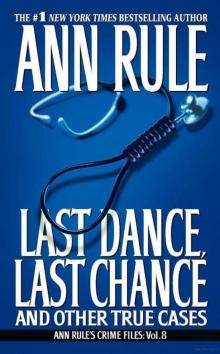 Last Dance, Last Chance
Last Dance, Last Chance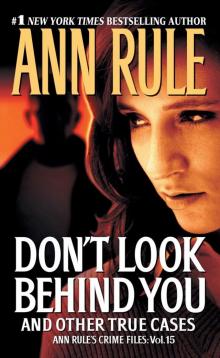 Don't Look Behind You
Don't Look Behind You